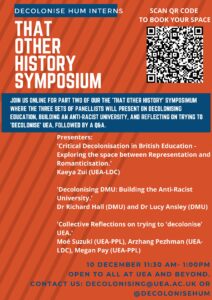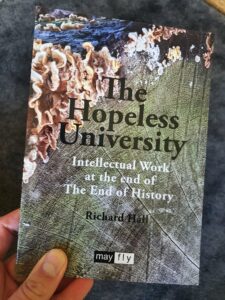At a couple of recent discussion events around The Hopeless University, I have been asked what is to be done? For a variety of reasons, I didn’t give the answers that I perhaps might have done. Instead, I pushed the idea that this was about revealing stories of trauma, denying the validity of externally-imposed recommendations, blueprints, and utopias, and developing new forms of relationality.
After the fact, and thinking this through in a little more detail, I realise that there is some safety for me in focusing upon the critique of the University, which is contained in the first five chapters of my book. This is a classic academic safety mechanism and learned behaviour. Now, I realise that I was denying people the opportunity (potentially) to discuss ways through the morass and hopelessness. Perhaps I was conditioned by the safety and security of a hopeless position. Perhaps I was also conditioned by my general tendency to feel alone in any room, left to pointing out what is wrong, rather than developing a sense of belonging that might help us walk elsewhere.
Anyway, this is what I now think, and I’m grateful to those who asked questions, and who have forced me to rethink what I think.
There is no way out but through
The final two chapters of the book position how I feel about our work in our universities. My position is that I have to work through my despair at the state of the world, and the structures, cultures and practices, which we have created, and that re-purpose themselves pathologically and methodologically to deny our agency. Doing this work takes courage and faith, not only in myself, but also in my relationships. Doing this work enables me to mourn the world we have created and reproduce, and thereby to yearn for something different, and to be indignant.
In this, I take heart from the return of history, and a sense that we have material agency in the world. I take heart from those who are building social networks around food banks, whilst I am indignant that they are needed. I take heart from those protesting in Hungary for LGBTQIA+ rights, whilst I am indignant that this work must be done. I take heart from those communities in Namibia protesting for reparations rather than simply reconciliation from Germany for its genocidal colonialism, whilst I am indignant that this work must be done. And on, and on, and on. And in this I recognise the skills, knowledges, capacities, capabilities, and humane values that enable the struggles, and that show us alternative ways of knowing the world.
I see a range of collective, lived experiences, which push against the capitalist notion that we are at the end of history, and that enforces particular forms of abstraction as limited, indirect or one-sided ways of knowing and experiencing the world. I see a range of collective, lived experiences, which shine a light upon an ability to sit with trauma and to push beyond it, and the ways in which our dominant political economy demands that we suture or cauterise our wounds in the name of business-as-usual.
These collective, lived experiences of trauma highlight the entangled nature of our subjectivities and beings, beyond their reduction to labour-power. Here, the idea of composting, decomposing and recycling appeals to me, because it is about acknowledging that we have created this system of social reproduction that denies humanity-in-nature. Therefore, we have the power to create something else. In the book I note:
Decomposing opens-up the struggle for plural worlds. Multiple, mutual ways of knowing erupt from the theorisation of singular, lived experiences, which themselves set the grounds upon which the manifestations of our exploitation, expropriation and extraction are made common. Whilst suffering is absolutely relative, situating the cause, rather than the effects, of that suffering in critiques of our mode of social reproduction, enable us to move beyond symptomatic responses, and address the ways in which our differences, fed upon and exacerbated by capital’s social metabolic control, also offer us a potential moment for mutuality and unity.
Here, a focus upon direct democracy between all individuals helps us to invert associations of capitals that deny humanity for-value. Decomposing these associations offers a way of constructing ecosystems that can recycle the nutrients of social goods into local communities. Communication across communities, or communes, such that a commune of communes acts as the basis for such ecosystems, is pivotal in defining and meeting universal social needs. Universities and their infrastructures are central to this process, including in their decomposition and recycling. They have the ability to help in the diffusion of technological and organisational solutions for reducing the realm of necessity, for generalising access to the means of production, and for refusing the extractive relationship between humans and nature. This requires a significant cognitive and psychological movement amongst individuals and communities. However, in asking those communities to discuss what is necessary for their existence, and how might they live in a world facing the intersection of crises, it is life-affirming.
The metaphor of decomposing enables me to see that capital and its institutions created mycorrhizal networks that infect and inflect our lives for the extraction of surplus. They make us redundant beyond our labour-power and become toxic to us because they internalise exploitation and expropriation in our very beings. Can we decompose this, remove the toxins produced by value, and recycle our skills, knowledges, ancestries, lands, capacities and hearts for another world?
We make our own history
We make our own history, and we have the ability to do so in every moment, and to do so collectively. In the book I write:
The present is pivotal, and the process of healing is one of questioning, and then mobilising or moving. This reproduces the potentiality of preguntando caminamos, or asking, we walk (Marcos 2002), as a recovery of the idea that we make our own history and our own paths through collective dialogue, based upon where we find ourselves. We can only move towards ‘our true heart’ (ibid.: 268) in the next moment, by understanding our modes of knowing, doing and being in the present moment. This teaches ‘how the world was born and show where it is to be found’ (ibid.: 276), as a movement of dignity. The struggle for movement delineates life as pedagogic practice, and erupts from our present, hopeless situation as a demand for generalised, intellectual engagement with alternative ways of making the world, and being in it. It is predicated upon abolishing separation, for instance between teacher and student, and transcending roles, such that each individual articulates their intellectual capabilities as a social activity.
This is a process of reintegration, in particular of self and other.
As history returns, this is also a struggle for reintegrating hope and hopelessness, such that we can be courageous and faithful in articulating our yearnings. This is a yearning beyond the forms, pathologies and methodologies of University labour. It is for intellectual work in society, which takes self-determination as its content and thereby opens-out new forms that give everyone free access to human intellectuality: everything must be for everyone. As a deeply relational practice (Yazzie Burkhart 2004), its starting point cannot be reform of the University and its crisis-driven existence. Like our ignorance, the search for a cure merely prolongs our agony. Instead, we must speak and listen, question and make paths, guided by those ‘who continue without hearing the voices of the powerful and the indifferent’ (Marcos 2002: 32).
Here, thinking about being guided by those who continue without hearing the voices of the powerful and the indifferent, I consider my own practice. How I can contribute to a new universal conception of life, framed around a counter-narrative to the universe of value. How I can help by listening to shared stories of trauma, and finding ways to build mutuality and new forms of relationality. How I can help those stories find new audiences. How I can help us recover our mass intellectuality at the level of society, rather than reproducing the general intellect as commodified knowledge from within the University.
I am also thinking about how such sharing might enable us to build a new qualitative experience of life, beyond its current quantification as human capital, commodity, surplus everything. Our ability to share and relate singular experiences of exploitation, expropriation and extraction, and to bring that into relations with the particular, colonial and patriarchal demands of our political economy, is a starting point for taking a step in a new direction.
This requires a different quality of relationship that points beyond power and prestige. It requires that we call out what we see and experience, and bring any privilege that we have to the use of others, in order that they can share their stories and we can build empathy. It requires that we remember what we have built collectively, and seek to dissolve that into the fabric of society, rather than seeking to extract rents from it.
It also demands that I focus upon building a base for a counter-narrative, through my work in a trade union, in committees, in mentoring, in projects, and also outside the University, in my relationships and voluntary work. Moreover, this needs to be grounded in care and dignity. It needs to be grounded in a collective discussion of the world for which we yearn, and pointed in a direction beyond the toxicity of capitalist reproduction and its institutions.
This discussion needs to accept that not everybody will chain themselves to a pipeline, be able to withstand being kettled on demonstrations, be able to teach, be able to write, be able to lobby, be able to bake, be able to care whilst others are protesting, and so on. However, we might accept that it is okay to bring our own selves to our collective struggles in those ways that nurture us. It took the system that we are in centuries to unfold as it has, and that will not be reversed overnight. The work of moving through painful and differential for different bodies, and will take time. But there is nothing else other than living death.
And in this ongoing, tortuous struggle, we might accept that whilst we act inside the University, we are also acting for a world beyond the University-as-is. We are looking to link our narratives of trauma to those elsewhere. We are looking to build solidarity across institutions, communities, networks and sectors, in order to describe other worlds. We are looking to accept the many-sidedness of life, and the many-sidedness of ourselves. We are looking to realise the end of the end of history.


